Last year, Catholic Extension Society began a new national initiative focused on helping parents across the country as they seek to effectively pass on the faith to their children. Our new Christian Parenting and Caregiving Initiative builds upon Catholic Extension Society’s decades of support for religious education in communities that lack resources and where families often face many challenges.
The new initiative allows Catholic faith leaders and parishes to come up with creative solutions that allow parents to navigate barriers and challenges in sharing the Catholic faith with their children. More importantly, the initiative seeks to empower parents in their roles as the primary teachers of the faith.
In its inaugural year, 20 parishes across eight dioceses participated. These parishes represent diverse families, including Latino, Anglo, Asian, Pacific Islander, and Native American. St. Charles Borromeo Parish on the Rosebud Reservation in South Dakota was among the first faith communities to participate. Below, Deacon Ben Black Bear II, an elder on the reservation, leads children in prayer by playing a traditional Lakota Drum.
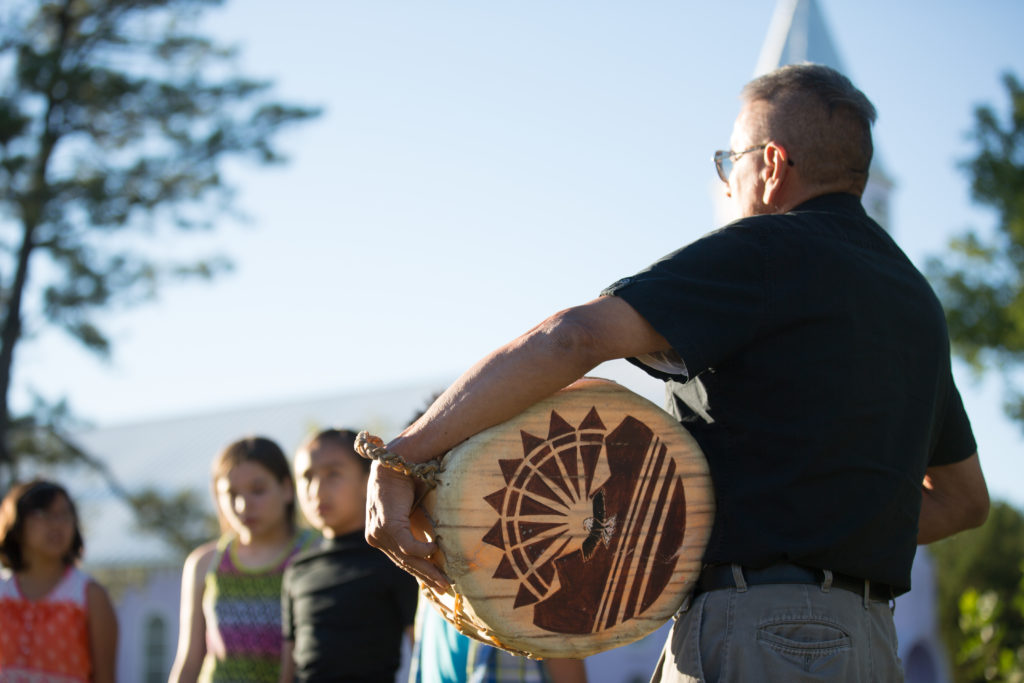
We have already learned a great deal after only one year, because the first step in this initiative involves gathering parents to hear what their struggles are in their children’s faith formation.
Some parents reference the growing distractions brought on by technologies and media that can easily become their children’s false god. Other busy families simply feel they don’t have the time to share the faith as they juggle school, extracurricular and work commitments.
And then there are many parents that are generally unsure if they are teaching their children about faith in the correct ways. “We teach them prayers and take them to church, but we aren’t sure what to teach and if we are teaching the right things,” said parents at St. Charles Borromeo.
Participating parishes commit to a two-phase program. The first component is a listening session, in which parents and caregivers meet with the parish and catechetical leaders. These sessions are led by a facilitator with a background in religious education. The initial listening sessions between parents and catechetical leaders give families the opportunity to identify not only their challenges but also the opportunities they have for living and learning the faith together with their children.
“I think the Christian Parenting and Caregiving Initiative is important because this is a great way for families and caregivers to strengthen teachings,” said Jenny Black Bear, director of religious education at St. Charles Borromeo and one of the facilitators of the initiative’s listening sessions.
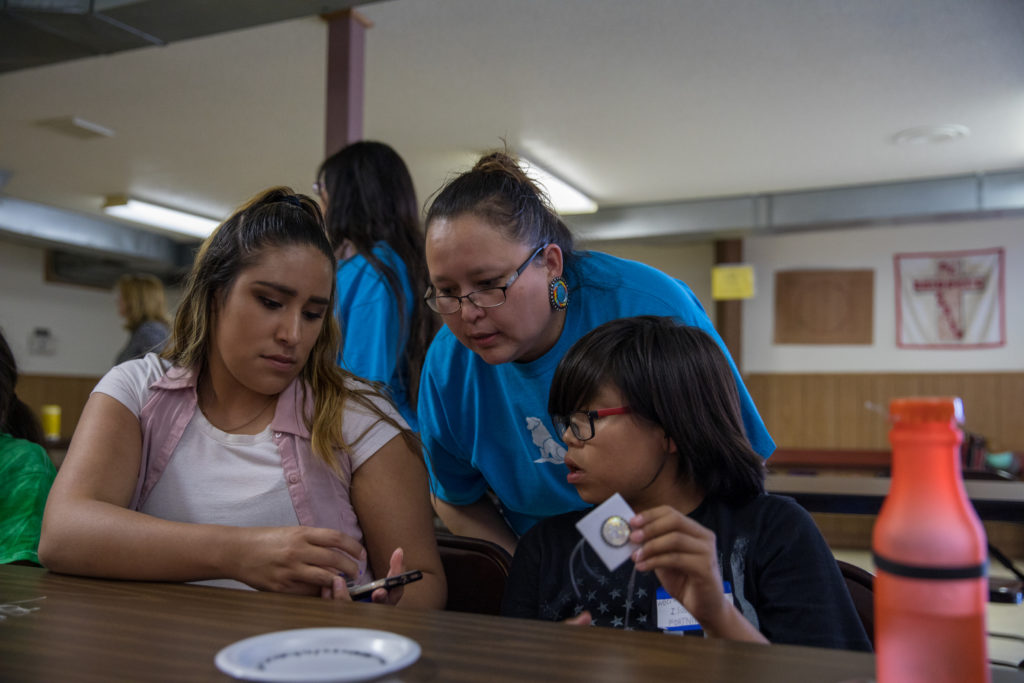
She continued,
“I think when families are included and know they are included, it gives them that confidence to know they were able to assist in creating a positive program.”
Teaching children to pray
St. Charles Borromeo, which has been supported by Catholic Extension Society since 1910, is located on the Rosebud Reservation in South Dakota and serves Sicangu Lakota Native American parishioners.
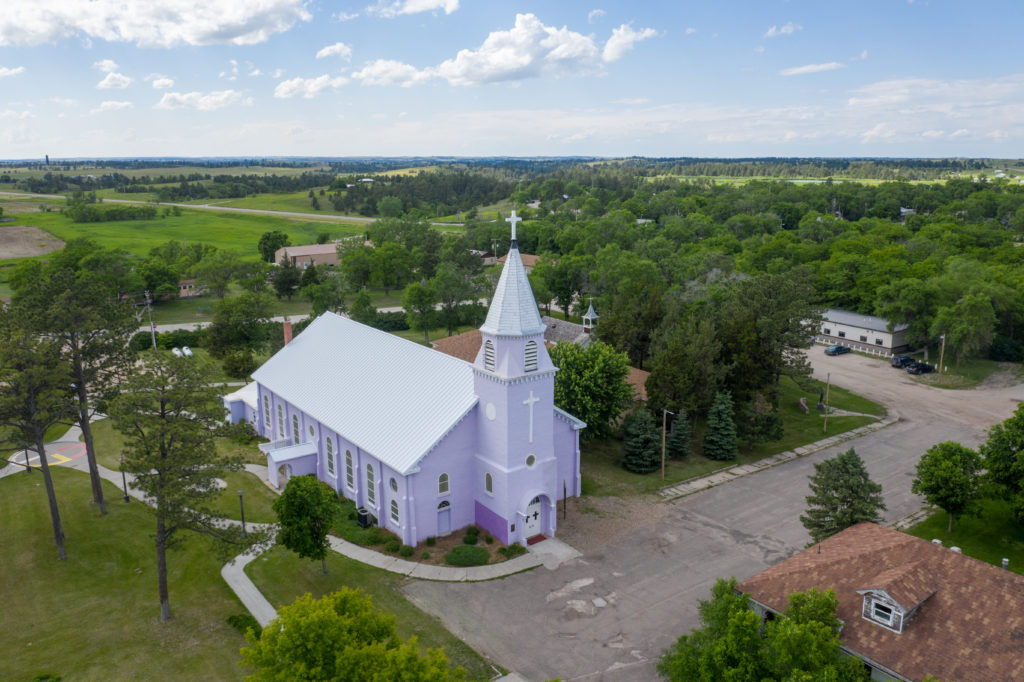
Jenny Black Bear and her husband, Ben Black Bear III, grew up in this community they now serve. Jenny has served as director of religious education for the mission since 2013.
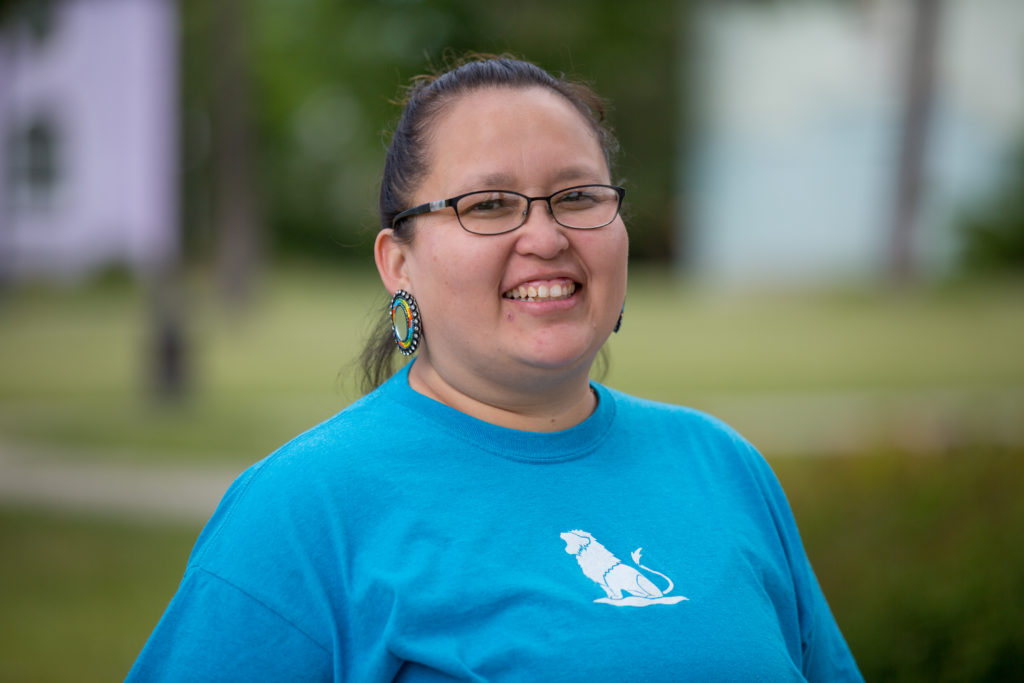
“A lot of us grew up learning our own cultural, spiritual ways and learning about the Catholic faith,” Jenny Black Bear recalled. “I teach both our Lakota culture and the Catholic faith. Teaching others that it is OK to be a Lakota and Catholic is important.”
Black Bear was the facilitator for her parish’s listening session, during which one Lakota elder spoke about the challenges of families lacking spirituality due to nobody teaching it. Another elder suggested teaching families how to pray, incorporating traditional Catholic prayers with traditional Lakota spirituality.
Based on the dialogue from this listening session and sticking with the theme of learning how to pray, St. Charles Borromeo hosted a “Family Day of Prayer.” The overall goal was to bring parents and children together for a day of learning more about the Catholic faith and its tie-ins to Lakota culture. Speakers and presenters taught families about traditional Lakota medicines. Rosaries were distributed and families were taught how to pray together.

They learned about Catholic saints like St. Kateri Tekakwitha. This family-based approach, which honors the wisdom of native elders, and the beauty of native cultures as a vehicle for transmitting the Catholic faith, echoes the pastoral framework for Indigenous ministry presented at the June 2024 General Assembly of the U.S. Catholic Conference of Bishops.
In this document the bishops stated: “Indigenous Peoples have strong oral traditions, and storytelling is a traditional way for Elders to anchor the younger generation to the past as a solid foundation for the future… There are many Native American traditions, practices and beliefs that complement and are parallel to Catholic doctrine and that facilitate instruction in the faith.”
Father Edmund Yainao, pastor of St. Charles Borromeo, pictured below at the Day of Prayer, agrees. He said,
Kids learn much about the Catholic faith from parents before any catechesis starts at Church. Family is the domestic church.”
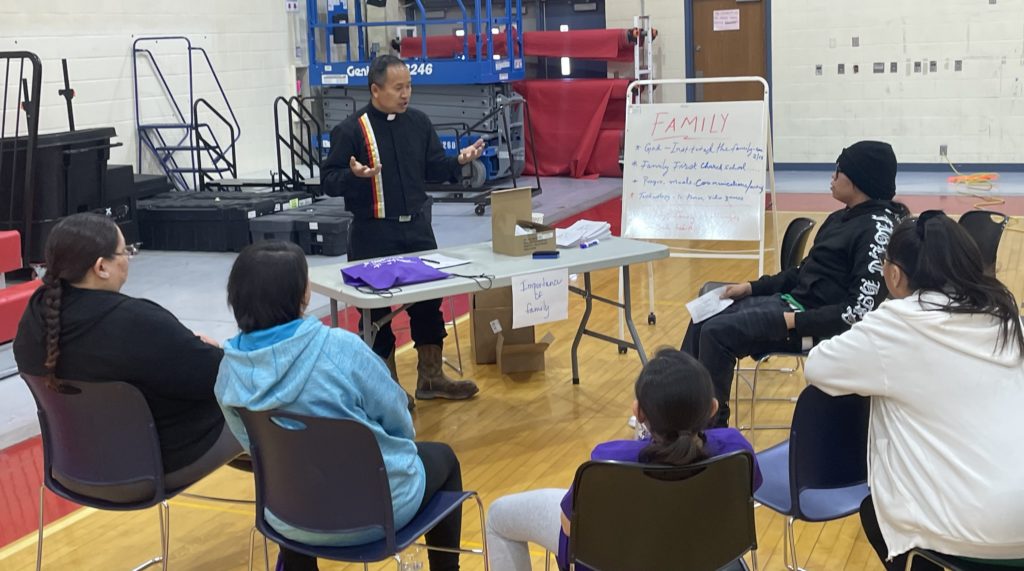
After the success of the first Family Day of Prayer, the parish is looking forward to hosting a second later this year. One teen responded, “I learned there are so many different ways to pray!”
Incorporating traditions
The linkages between faith, family and culture are strong in Latino communities as well. From the Diocese of El Paso, Texas, Verónica Rayas, Ph.D., explained: “Catechesis cannot be a generic, one-size-fits-all approach. It must be rooted in people’s daily experiences of faith, which have historically been celebrated in religio-cultural traditions. This does not mean catechesis is promoting any particular culture. However, each culture contains elements that incarnate the Gospel message. It is this rich diversity that we must embrace and incorporate.”
Rayas earned a master’s degree from Fordham University with a scholarship from Catholic Extension Society, and a Ph.D. in religious education. She wrote her dissertation on the ways that Hispanics teach their faith within the family: sharing meals, language and traditions. She has been leading religious education efforts in her hometown of El Paso ever since, putting these ideas into practice.
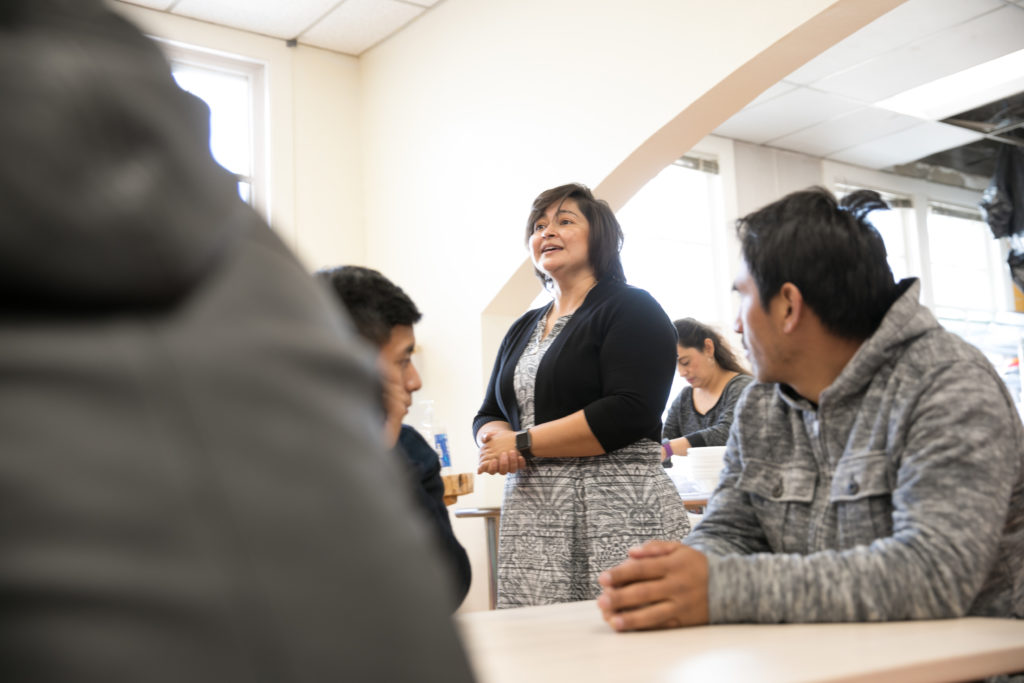
After facilitating listening sessions for the Christian Parenting and Caregiving Initiative in her diocese, Rayas helped parents implement “El Niño Dios” (the Child Christ) pilot project. This focused on Hispanic Christmas traditions centered on the baby Jesus.
Each child was given a baby Jesus on December 24 to care for and nurture throughout the Christmas season.
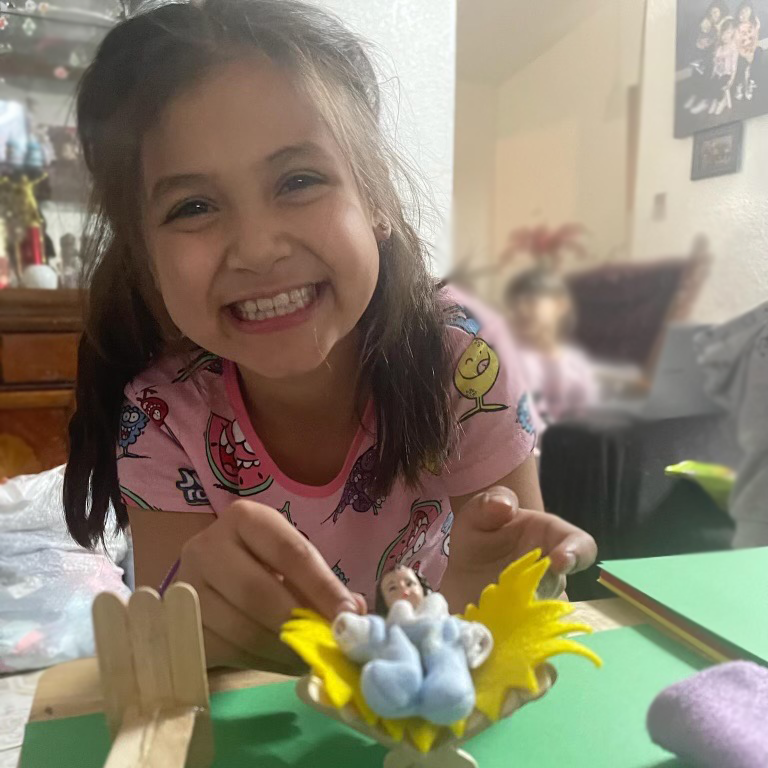
Parents encouraged their children to make a little bed for Him next to their bed, give Him clothes, carry Him throughout the day to ensure He is cared for and safe and most importantly, talk to Him—especially at night before bed. Through this, parents could guide their children toward the beginnings of a relationship with Jesus.
“Children could not imagine leaving Him home alone,” Rayas said of the testimonials she received. “They played with Him and talked to Him about the events of the day and concerns.”
The experience culminated 40 days after Jesus’ birth when He was presented in the temple. The children brought the child Jesus to Mass for a blessing, and later in the evening had a celebration with prayer, singing and tamales.
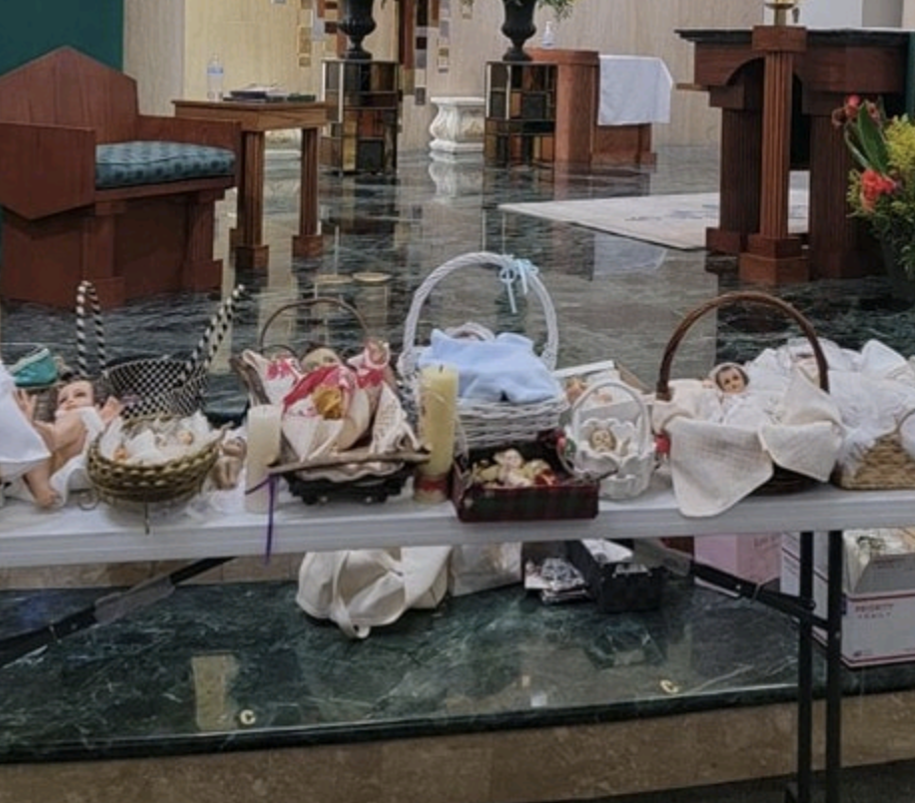
Even when the 40 days of “the project” were over and the children were no longer required to carry their child Jesus, many parents reported back to Rayas that their children continued to interact with Jesus. “After the Presentation when they did not need to carry him around anymore, many parents talked about their children coming home from school to go to the baby Jesus figurine and talk to Him or just check on Him,” Rayas said.
“Through this centuries-old Hispanic tradition, children develop a relationship with Jesus as a baby in need of protection and care. Jesus becomes a tangible figure in their imagination, a friend and companion on their spiritual journey,” Rayas further explained.
A “vital” investment
After the successful pilot projects in El Paso and South Dakota, Rayas and Black Bear have been leading listening sessions and helping with project implementation for the Christian Parenting and Caregiving Initiative in faith communities across the country, including in Montana, Wyoming, Louisiana and Iowa. In Louisiana, Mary Mother of Jesus Church in the Diocese of Alexandria held a listening session as part of the program this spring.
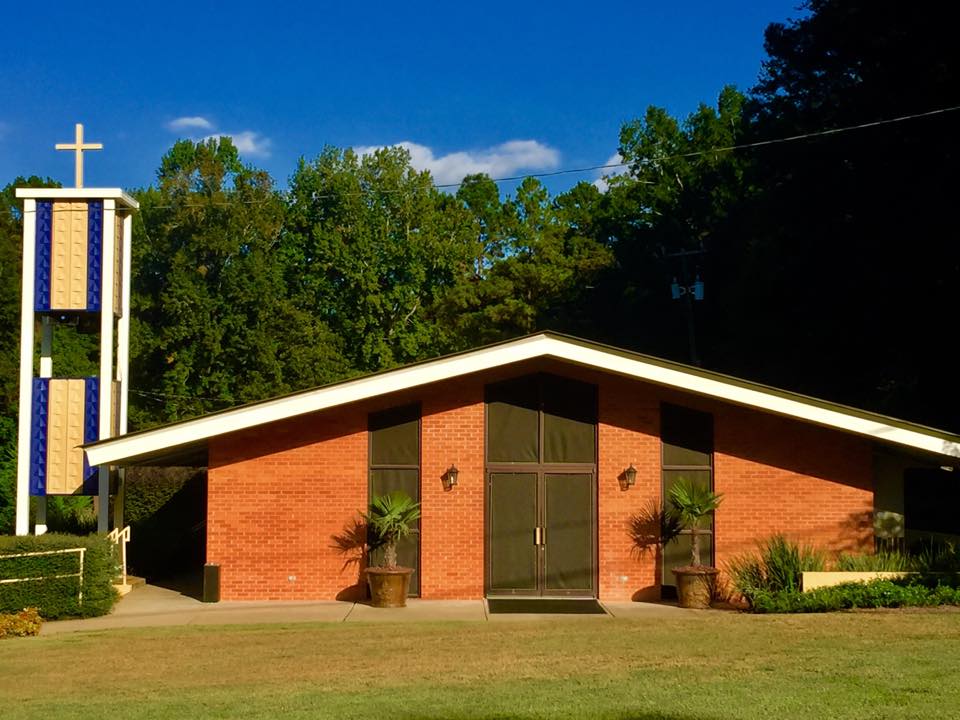
Parents and caregivers are the catalysts of Catholic education for the next generation of young, curious minds. Their efforts in passing down the faith are given a boost thanks to this powerful new program in Catholic teaching. Rayas says,
The Christian Parenting and Caregiving Initiative is a vital investment in parishes and families.”
She concludes, “It empowers parents through comprehensive education and strong community support. This empowerment enables parents to confidently and effectively hand on the Catholic faith, ensuring that it is deeply rooted in the hearts and minds of the next generation.”
We look forward to regularly sharing more creative examples of family-based faith programs that arise from future participants in this initiative. The Christian Parenting and Caregiving Initiative is made possible thanks to the generosity of our donors. Please consider supporting our mission!


